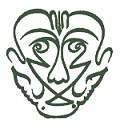Serving the Guest: A Sufi Cookbook
Essays | Recipes | Gallery
There was in Dobruja a seven-headed dragon, to which the two daughters of the King were allotted as food. Sari Saltik (who had been sent to the region by Hajji Bektash himself) agreed to deliver the girls if their father would embrace Islam. He went to the column to which they were tied as victims for the dragon, accompanied by his seventy Dervishes, who were beating drums and swinging the banner. He untied the Princesses, and then waited with his wooden sword, expecting the dragon himself, as the seventy Dervishes beat their drums.
When the dragon approached, Sari Saltik addressed it with the verse of the Qur'an that begins, "Greeting on Noah in both worlds." He then cut off three of the dragon's heads, so that it fled with the remaining four. Sari Saltik followed him up to his cave, at the entrance of which he cut off the remaining heads with his wooden sword, and followed the dragon into his den. The beheaded dragon began to struggle with Sari Saltik and to press him against the rock, which gave way under his hands and feet — their marks can still be seen there. The dragon, having exhausted his strength, fell to the ground dead, and Sari Saltik, with his bloody breast and wooden sword, now led the two girls to their father the king.
But the man who had shown Saltik Sultan the road to the column had picked up the tongues and ears of the three heads cut off, and had hurried before Sari Saltik to lay them before the king, boasting that he himself had killed the dragon. Now, though the daughters asserted the contrary, yet the impostor persisted in his boast, so Sari Saltik proposed as a proof, to be boiled with the man in a cauldron. Though the pretender did not like this kind of trial, yet by order of the king he was obliged to undergo it. Sari Saltik was tied up by his Dervishes, and the impostor by his companions, and both were put into a cauldron heated by an immense fire.

Hajji Bektash was at that moment at Kirshehri in Anatolia, and was suddenly overcome. He swept with a handkerchief a dripping rock, saying, "My Saltik Muhammad is now in great anxiety, may Allah help him!" Ever since that day salt water has dripped from that rock, and from thence the salt called Hajji Bektash is produced.
from Serving the Guest: A Sufi Cookbook
Copyright © 1999, 2000 by Kathleen Seidel
Sources of previously published material by other authors used by permission, and print sources for images, may be found at http://www.superluminal.com/cookbook.
